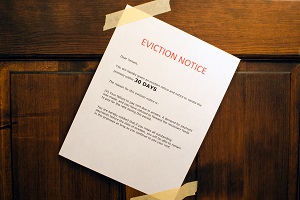Evictions: Act Fast, Better Safe Than Sorry
Eviction is a legal process that removes somebody from their rental property so to get evicted you first are provided with a notice called a pay or vacate usually it’s a three-day pay or vacate order notice and after that then the landlord files a lawsuit in court asking the court for an order to evict.
What’s The Difference Between An Eviction & A Foreclosure?
An eviction is limited for renters, it’s a legal action by a landlord to move the people who are in the rental unit out of the property, and it goes against the people and not the property.
A foreclosure on the other hand is a legal action by a mortgage company or sometimes a taxing entity like your property tax, people your county taxes to reclaim the real property to reclaim the real estate.
It happens when the owners have defaulted on their mortgage payments or their taxes, so kind of the hard and fast rule is eviction is for renters, foreclosure is for homeowners.
They both have to do with not paying and or not being able to pay and they’re both legal actions.
Do evictions happen only in a rental situation or are there some scenarios where maybe my landlord doesn’t fully own the property that it might I might end up in an eviction situation? Evictions do only happen in rental properties.

Process Of Eviction
The good thing on the renter’s side is that nothing happens immediately, nothing happens overnight.
We talk in American jurisprudence about the due process a lot, and due process has to do with giving everybody involved a chance to respond, a chance to make it right.
Sometimes we call that curing, so there’s a time frame that this happens on so we mentioned the payer vacate order.
That’s what happens first by law, a landlord has to give you a three-day opportunity to catch up on rent, and there are lots of reasons to evict.
The kind of evictions that we work with, have to do with if you’re evicted because you’re behind on rent or you haven’t paid rent, but a landlord may evict you if you’re doing something illegal in the property or you’ve created a dangerous situation in the property, that’s not a bankruptcy solution.
There are lots of reasons to evict a person and some of them are flat-out illegal so you have other routes that are available to you if you’re being evicted for those reasons.
How Do I Know I’m Being Evicted?
There’s this idea that we have due process, and part of the due process idea is that you have to be given notice, they can’t just pull the rug out from under you, so the first way that you get noticed is that three-day pay or vacate.
Usually, these notices are posted on your front door so you simply can’t miss it you can’t say I didn’t get that piece of mail it’s right there on the front door, and then if nothing happens if you don’t pay and if you don’t vacate the lawsuit it usually starts with something called a complaint.
They can file the lawsuit and then that’s a second chance where you do get notice of the lawsuit that might happen by mail, it also might happen by personal service where somebody shows up like in the movies and says: are you Joe Schmoe? Yes, I am, who’s asking? You’ve been served, that kind of thing, so, once a lawsuit has been filed under Texas law, there is a hearing that is scheduled, and that hearing cannot take place for at least 10 days.
In most jurisdictions, it’ll be at least 20 days so you get a period to answer the lawsuit.
The hearing gives you a chance to show up in front of a judge and plead your case, it’s as simple as that, you show up and say I was laid off for covet or I broke my arm I couldn’t work, whatever.
If you don’t respond to the lawsuit if you just let it go or you didn’t answer in time, there’s a default judgment, and that’s where the eviction happens.
The eviction is the order that shows up saying you’ve been evicted and that’s what goes on your record, which can make it harder for you to rent down the road.
Once there’s an eviction order then there’s a five-day waiting period where the renter has the chance to appeal, and if the renter does not appeal then if you’re not out by then the landlord, they can ask the court for a writ of execution, and that then gives the court the ability to ask a constable to force the renter out.
The constable will give you 24 hours’ notice before they show up but they will say I will be here at 9 00 a.m and come hell or high water you’re going to be out of that rental.
How do we know if we are getting evicted? Usually, there are lots and lots of chances to get noticed.
What are the risks of not doing anything about the eviction? & Why does time matter?
You risk being forcibly removed from your home, it’s pretty traumatic.
If you just ignore everything you don’t pay or vacate, you don’t show up at the hearing, you don’t answer the lawsuit, there will be a constable at your door who’s going to walk in with a court order, they’re allowed to do that and start putting your things on the front lawn, it’s not a good scene at all.
Is it important for me to act fast when I get that notice?
The timing is very important, we have a blog post about the eviction process and when bankruptcy might help you or how bankruptcy can help you at different points in the process.
Technically you can file a bankruptcy 5 minutes before the constable walks into your house and it would stop it, it’s an automatic stay.
The automatic stay in bankruptcy just happens at the very second you file that case, however, you don’t want to wait till the last minute because even though you can, it doesn’t mean you should like a lot of things in life.
Bankruptcy is a complex process, you can file an emergency bankruptcy petition but you still have to complete a one-hour online class, you still have to gather a bunch of documents, not all the documents like in all regular bankruptcy, but you still have work to do and then your attorney needs time to prepare the petition, review it with you, get it filed.
If you can file your bankruptcy before the court enters an eviction judgment.
If you don’t show up to the hearing they can file a judgment, then your chances of finding a new rental are much easier if you don’t have an eviction on your record.
In general, it’s just so much better and easier to be proactive than trying to clean up a mess when it’s an emergency and everybody’s scrambling, and we may or may not be available to take a case, it’s just better to be proactive.
Are Evictions Always The Same In Every State?
Not really, the only thing that’s different from state to state is that we’ve seen and we’ve worked in 4 different states.
Now is the time frame for when you have to respond if you file an eviction notice if you file the eviction complaint in court.
Some states you have 20 days, other states you have 30 days.
In some counties in Texas, it’s 20 days plus, and then the Monday after those 20 days has run, so you kind of have to look at your apple calendar to figure that out but for the most part, there’s always pay or vacate piece for that three-day notice.
It’s always a court proceeding again because of due process in the constitution, and it’s always a legal proceeding that ends up in a judgment if it does go forward.
What Can I Do To Stop Eviction?
Depending on why you’re being evicted, we’re just dealing with financial reasons for eviction, then you want to start with finding all resources to be able to catch up on rent.
Texas rent relief is a great resource to find additional funds if they do still have funding to help you catch up on that.
The best option is to be in communication with any creditor, the ostrich technique of going in your apartment and locking the door and not talking to your landlord isn’t going to make anything any better, but oftentimes they’re willing to work with you.
If none of those things work, call a bankruptcy attorney, because there are ways that you can either walk away and not owe any back rent or work out some kind of solution so you can stay in your home.
How Long Does Eviction Protection Last?
The protection isn’t just eviction protection, and it happens the very second you file your bankruptcy and it lasts generally through the whole bankruptcy.
Any creditor (a landlord or anybody else) can ask the court for an order lifting the Automatic Stay, so if you’re sitting in that apartment and you haven’t paid, you haven’t made any arrangements to pay, the landlord might go to bankruptcy court and say: look, we need to be able to re-rent this place, we need these people out, so we’re going to ask the court for an order lifting the Automatic Stay, so we can go forward with that eviction proceeding.
In chapter 7 they usually don’t do that, but we have seen it happen, but often they’ll just wait the 90 days of a chapter 7 bankruptcy, and when that’s over then they can go ahead and start the eviction proceedings over again.
Can You Be Evicted A Second Time?
Yes, outside of bankruptcy you can be evicted as many times as you have different landlords and don’t pay so absolutely you can it would be unusual to be evicted from the same place twice, because once a landlord has that eviction order from the court then they have the means to get you out with the rid of execution with the constable.
Ways To Avoid An Eviction Situation

There are a few practical things, we strongly recommend people keep a budget so if you can cut back on.
If you have some extra income course, you would need your landlord’s permission to have that roommate come in, and that could generate some extra income and it would show your landlord that you’re able to pay more moving forward, so you can catch up on that rent, but really once you start getting behind be in communication with your landlord, and then be proactive and talk to a bankruptcy attorney.
How Can Austin Bankruptcy Lawyers Can Help You With Eviction
The very first thing is to give a call to Austin Bankruptcy Lawyers, our intake people and our client care people will ask you some questions like how far behind are you, how much is your rent, if you didn’t have the rent that a rear edge that was building up, would you be able to make ends meet on whatever income you do have, do you want to stay in your rental, or do you want to move to someplace new, when is that hearing, are we looking at a last-minute situation where we might have to scramble a little bit, or do we have some time and then we strategize after that.
Bankruptcy can buy you time to get out of that rental or it can help you stay in the rental if that’s home and you want to stay there, and we also take a good hard look.
We do a full analysis of your budget, your income, your expenses, we take a look at where you might be able to tighten the belt a little bit more or where you need to spend a little more.
Surprisingly sometimes you need to spend a little bit more and we just do that whole analysis.
We take a team approach and we try our very very hardest to help you reach your goals whatever they are staying leaving getting back on your feet fresh start whatever it is.
Share This Story!
& Let’s Discuss How We Can Best Help Eliminate Your Specific Financial Struggles!



